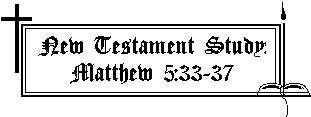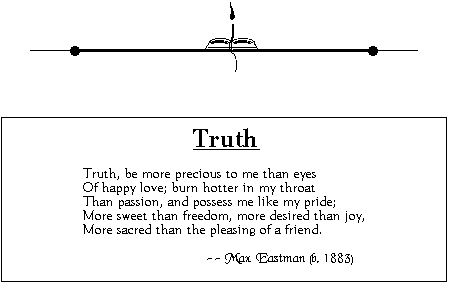

33"Again, you have heard that it was said to the people long ago, `Do not break your oath, but keep the oaths you have made to the Lord.' 34But I tell you, Do not swear at all: either by heaven, for it is God's throne; 35or by the earth, for it is His footstool; or by Jerusalem, for it is the city of the Great King. 36And do not swear by your head, for you cannot make even one hair white or black. 37Simply let your `Yes' be `Yes', and your `No', `No'; anything beyond this comes from the evil one."
Here, Jesus continues speaking to His disciples concerning the Law of God. Recall that Jesus prefaced this section of the Sermon on the Mount by saying: "For I tell you that unless your righteousness surpasses that of the Pharisees and the teachers of the law, you will certainly not enter the kingdom of heaven" (Matt. 5:20). Then He proceeded to give His disciples six examples of how their righteousness must exceed that of the Pharisees: concerning anger (vss. 21-26), concerning lust (vss. 27-30), concerning marriage (vss. 31-32), concerning truthfulness (vss. 33-37, the text we will look at in this study), concerning revenge (vss. 38-42), and concerning love for others (vss. 43-47). Jesus will end this section of His discourse by summing it all up: "Be perfect, therefore, as your heavenly Father is perfect" (vs. 48). And so, the goal of all these teachings is that we would "be perfect". "But wait!", you may say, "Jesus desires that I be perfect!? I can't do that!" Quite right. The holiness of our Lord Jesus requires that His teaching demand perfect righteousness. Therefore, these teachings will be difficult--yes, impossible--to consistently and unerringly carry out. Jesus knows quite well that we cannot attain perfection in this world. That is why He went to great lengths to see that His perfect righteousness may be credited to us. He died for us, taking the punishment that we deserve for our lack of perfection, so that He could bestow upon us His righteousness as a gift. Praise be to the Lord!
We are currently in the midst of these teachings concerning how our "righteousness should surpass that of the Pharisees." Jesus begins this section concerning truthfulness: "Again, you have heard that it was said to the people long ago, `Do not break your oath, but keep the oaths you have made to the Lord'" (vs. 33). Jesus cites here the teaching that the people had been hearing from the Pharisees about oaths: "Do not break your oath, but keep the oaths you have made to the Lord." The sense here is that the Pharisees were saying: "You shouldn't break your oaths, but always make sure you keep your oaths that are made to the Lord." At the time, there was Rabbinical teaching that said that only oaths made "by God" were legally binding. Furthermore, the Rabbinical teachers themselves defined for the people exactly what an oath made "by God" was. Later, Jesus dresses down the Pharisees for inventing such regulations:
"Woe to you, blind guides! You say, `If anyone swears by the temple, it means nothing; but if anyone swears by the gold of the temple, he is bound by his oath.' You blind fools! Which is greater: the gold, or the temple that makes the gold sacred? You also say, `If anyone swears by the altar, it means nothing; but if anyone swears by the gift on it, he is bound by his oath.' You blind men! Which is greater: the gift, or the altar that makes the gift sacred? Therefore, he who swears by the altar swears by it and by everything on it. And he who swears by the temple swears by it and by the one who dwells in it. And he who swears by heaven swears by God's throne and by the one who sits on it" (Matt. 23:16-22).
The result of the pharasaical reading of the law concerning oaths was that no one knew if a man would keep his oath: truth was compromised. If a man swore an oath "by heaven", the hearer may have thought that it seemed that this man would tell the truth, because, after all, God lives in heaven. But technically, according to this pharasaical teaching, the swearer was not legally bound to keep his oath because he did not swear by something close enough (in their view) to God. So, rather than strengthening the truth, oaths became vehicles for telling lies.
In the case of oaths, the Law of God was far more strict than the Pharisees made it out to be. Here is the actual teaching from the law: "When a man makes a vow to the LORD or takes an oath to bind himself by a pledge, he must not break his word but must do everything he said" (Num. 30:2). The law is unequivocal: in any case, a man "must not break his word but must do everything he said." The essence of the law is that all oaths must be completely carried out. They are not to be taken lightly. Moreover, the Law of God forbids us to make oaths in any other name than the name of God: "Fear the LORD your God and serve Him. Hold fast to Him and take your oaths in His name" (Deut. 10:20; see also Deut. 6:13). This part of the law concerning oaths is conspicuously absent from the pharasaical regulations on taking oaths. Rather than forbidding oaths in other things, the Pharisees merely declared those oaths to be non-binding.
In Jesus' time, oaths and vows were very important in the business world. They did not have written contracts or contract lawyers: a man's word was the contract. Thus, a businessman had to be confident that an oath was binding in order to be able to carry out business. Jesus here is commanding that oaths be used as originally intended by God: as a surety that the swearer considered himself to be bound by the oath. And so, Jesus here forbids the specious use of oaths by saying that his disciples are not to swear at all "by heaven... or by the earth... or by Jerusalem... or by [one's] head" (vss. 35, 36). By disallowing these oaths, Jesus was requiring that the disciples righteousness exceed that of the Pharisees, who did not forbid, and even themselves used, the specious oaths.
Jesus sums up His teaching: "Simply let your `Yes' be `Yes', and your `No', `No'; anything beyond this comes from the evil one" (vs. 37). In other words: Just tell the truth!!! When you speak, people shouldn't have to do any calculating to determine whether or not you are telling the truth. Your words should be true in both literal and implicative meanings. Your character should exude truthfulness. Jesus desires that his disciples always speak truthfully. The world should consider that the word of a Christian can be relied upon. If you speak truthfully, and everyone knows it, there is no need for the taking of oaths to support your statements. As Jesus states, anything beyond the absolute truth "comes from the evil one."
And so Father, help us by Your Spirit, to be truthful, just as You are true, and to be faithful to others, just as You are faithful. May the world be able to trust our words, just as we can trust Your Word. In the name of Jesus Christ, who was Himself faithful in living out Your Word, we pray these things, Amen.
